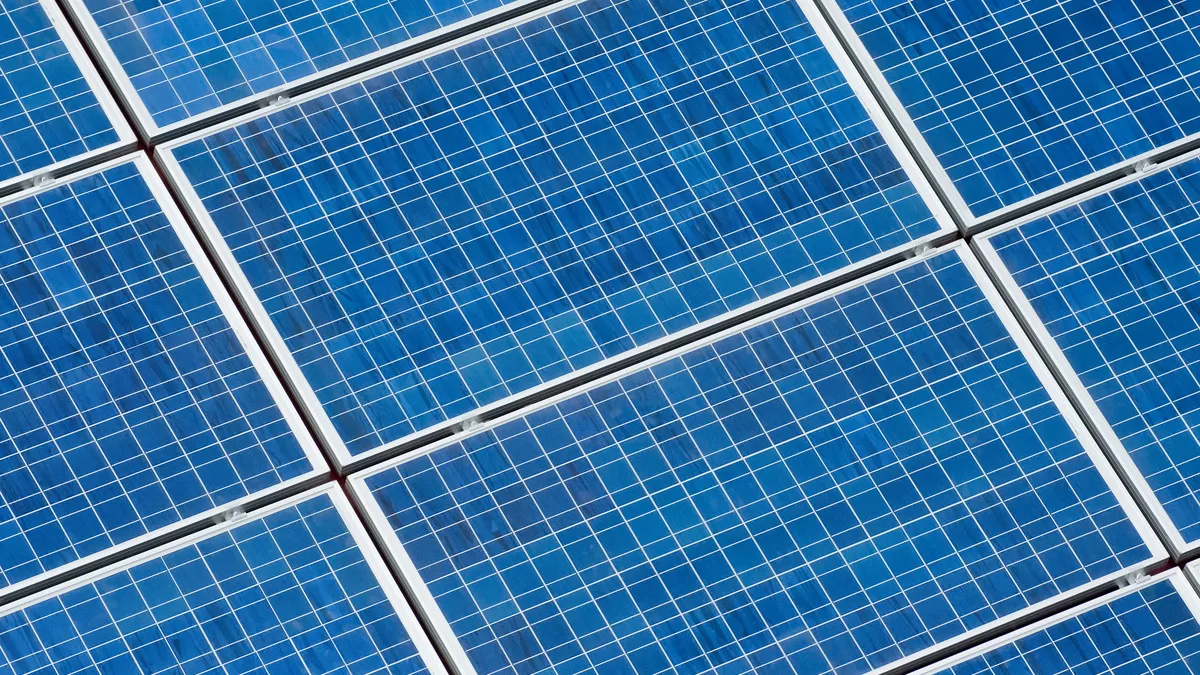Dive Brief:
- The U.S. Department of Energy (DOE) on Tuesday announced plans to encourage deployment of more solar and storage in low- and moderate-income communities, including a more than $15 million commitment for technical assistance and to help underserved areas attract investment.
- The new initiatives and funding will help advance DOE's justice, equity, diversity, and inclusion (JEDI) goals, Energy Secretary Jennifer Granholm said in a statement, including by expanding access to clean energy and fostering a more diverse solar workforce.
- Equity in the clean energy transition was also on the agenda Tuesday at the EE Global Forum. Jigar Shah, head of DOE's Loan Programs Office, said it is "obvious" that equity issues were not a priority for the office under previous administrations.
Dive Insight:
Decarbonizing the electricity sector by 2035 will mean delivering clean energy to all communities. Shah, who founded solar company SunEdison, said it can be more difficult or expensive to get renewables projects built in some areas, but DOE is committed to changing that.
The Biden administration is "very committed to equity," Shah said. But "it is obvious the loan program office has not participated in this issue. We do billion-dollar solar farms and billion-dollar wind farms, or geothermal facilities, or [work with] Ford Motor Co., or a Tesla manufacturing facility."
To address the disconnect, Shah said DOE "started a listening tour" and has had talks with more than 40 groups including residential solar installers and municipalities "around where they thought we might have the most impact."
Through these discussions, the agency has heard that customer acquisition costs in low- and moderate-income communities are "very high," Shah said. "It costs more to serve these communities, to gain their trust, than it does with other communities."
DOE said its new funding and initiatives will "support solar energy deployment in underserved communities and build a diverse, skilled workforce."
The announcement included $10 million in funding for a SolSmart administrator for the next five years to "update and manage the program to encourage more equitable solar deployment and the adoption of emerging technologies, such as solar + storage."
The SolSmart program, funded by the DOE Solar Energy Technologies Office, already offers free technical assistance to cities, counties and regional organizations. The office will now "expand to focus on rural and low- and moderate-income communities," DOE said.
The agency will also make available $5.5 million in technical assistance through the Solar Energy Innovation Network (SEIN). The program connects technical experts at DOE’s national laboratories with utilities, system operators, local governments and other groups.
DOE said the new funding will support a third round of research efforts at SEIN, "which will focus on creating new solutions for solar deployment in underserved communities and replicating solutions developed in previous rounds."
The funding "will jump-start a long-overdue conversation around how DOE can leverage solar energy’s explosive growth," Granholm said, including to address JEDI goals.
DOE also announced a pair of requests for information (RFI), including one focused on equitable access to community-based solar. The agency said it plans to host a series of meetings with environmental justice organizations, state and local governments, solar developers and others "to solicit feedback on how these projects can best address energy challenges in underserved communities."
The second RFI, focused on workforce development, will "gather information on how best to frame future workforce funding that ensures new jobs offer good wages, benefits, and worker protections." DOE said it is also planning meetings and will ask for feedback from labor unions and the solar industry "on its plans to provide targeted training efforts."
Addressing equity issues in energy efficiency, particularly in project funding, will also be key to decarbonization, said Holmes Hummel, founder of Clean Energy Works, a nonprofit focused on accelerating financing for the sector. Hummel was a DOE advisor under the Obama administration.
Energy efficiency projects have similar financing profiles, Hummel said, including high up-front costs and low operating costs over the life of an investment. "Financing mechanisms that are effective in overcoming the first-cost barrier of energy efficiency projects ... have systematically disqualified or discouraged a majority of households and small business in the U.S.," Hummel said.
"There isn't a path to a 100% clean energy future with only half the people," Hummel said. "We have to find financing mechanisms that can clear that upfront cost barrier on terms that are acceptable to everyone, from all backgrounds, in any income, credit score or renter status."















